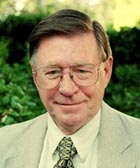Ronald Downey, Ph.D.
 Contact Information
Contact Information
Office: BH 472
Phone: Office 532-5475; Cell 785-341-6330
E-mail: downey@ksu.edu
Educational Background
University of Texas, Austin, B.A., 1966, Psychology
Temple University, M.A., 1968, Psychology
Temple University, Ph.D., 1971, Quantitative Psychology
Dr. Downey retired at the end of the 2013 academic year after 38 years of service at Kansas State University with the title of Professor Emeritus and Associate Provost Emeritus. He will continue to work with past students and colleagues on current research projects and manuscripts.
Dr. Downey will be continuing as an Executive Editor for the Journal of Psychology: Interdisciplinary and Applied. He will also continue to serve as a reviewer for other journals in the Industrial and Organizational area.
Dr. Downey continues to be engaged in a variety of community activities. He has served on the boards for The Crisis Center, The Boys and Girls Club, United Way, and The Manhattan Community Gardens. He plans to continue this service to the Manhattan Community.
Research Interests
Over the years several themes have emerged in Dr. Downey's research. Dr. Downey’s students and colleagues have supported much of this work. The major efforts have included: 1) part-time employment; 2) service orientation of employees; 3) work-family conflict; 4) job stress and burnout; 5) customer contact; and employee engagement. When possible, these efforts have over lapped. Brief descriptions of these major areas follow.
Part-time Employment: As part of a contract with a quick service restaurant chain, one of Dr. Downey's graduate students conducted a study of part-time workers. This was based on a nation-wide survey of crew members. This line of research identified the general characteristics of part-time workers and how they differed from full-time employees. One of the more important findings was that part-time workers with a greater sense of job control (e.g., scheduling of work) were more satisfied with their work and had a lower intention to leave. Several of Dr. Downey's students' theses and dissertations involved part-time work and control. Dr. Downey's interests in service orientation and work-family conflict grew out of this study and were expanded in later studies.
Service Orientation of Employees: The crew survey also contained a brief set of questions related to service orientation of employees. Dr. Downey has continued working on the development of this scale. This work has demonstrated the importance of employees' perceptions of the service environment in understanding the quality of service provided by an organization. Much of the earlier work in this area was done in conjunction with students from the Institutional Management program here at K-State. More recently, this work has now been linked with the Job Burnout and Customer Contact Work being done by Dr. Downey's students.
Work-Family Conflict: Dr. Downey's efforts in this area were primarily carried out by two of his students in their dissertations. One linked work-family conflict to job satisfaction and included a large part-time sample. The second dissertation developed a new approach to work-family conflict and included the concept of family-work conflict (i.e., the degree to which work causes conflict with the family). This is clearly a critical issue in today's workforce.
Job Stress and Burnout: This is a more recent effort by Dr. Downey's students. The interest has been on understanding the antecedents and consequences of job burnout. He and his students have explicitly linked this work to a service environment and customer contact issues. Their work suggests that both traits of the workers and the state of the organization need to be considered in understanding the service environment.
Customer Contact: This has been a more recent effort and grew out of Dr. Downey's job burnout research. Many researchers have named customer contact as the source of job burnout, but little work has been done to empirically demonstrate this or to understand the nature of the customer contact. Preliminary work has concerned developing a better understanding of the contact and develops ways to measure it. Preliminary research has found that customer contact is a multi-faceted construct (e.g., frequency, emotional content, etc.). The various facets are directly related to different aspects of job burnout.
Employee Engagement: Again, this is a more recent area of development and grew out of Drs. Peter Shin’s and Andy Wefald’s dissertations. Employee engagement is a concept about how tied workers are to the physical, emotional, and cognitive aspects of their work. It is a relatively new area of research. Our work has focus on Dr. Shirom’s definitions and measures. Job engagement has been found to be a good predictor of job satisfaction, job commitment; and intention to leave the job.
To contact Dr. Downey email him at downey@ksu.edu.
